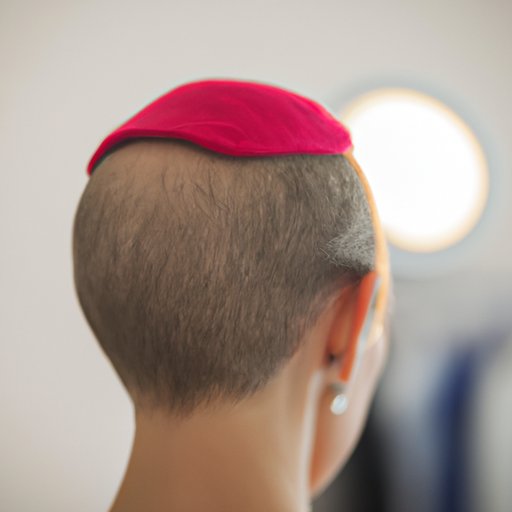Introduction
Cancer is a medical condition in which abnormal cells divide without control and can invade other tissues. Hair loss, or alopecia, is a common symptom associated with many diseases, including cancer. In this article, we will explore the connection between cancer and hair loss, and discuss how to manage hair loss during cancer treatment.

Exploring the Connection Between Cancer and Hair Loss
Different types of cancer can lead to hair loss. For example, non-Hodgkin’s lymphoma is a type of cancer that affects the lymphatic system, and it can cause hair loss due to the growth of abnormal cells in the scalp. Other types of cancer, such as leukemia and breast cancer, can also cause hair loss. In some cases, hair loss may be a sign of advanced cancer.
In addition to the direct effects of cancer on the scalp, cancer treatments can also cause hair loss. Radiation therapy and chemotherapy are two common treatments used to treat cancer, and both can lead to hair loss. Radiation therapy works by targeting cancer cells with high doses of radiation, which can damage healthy cells in the scalp and lead to hair loss. Chemotherapy drugs can also cause hair loss by damaging the hair follicles.
How Cancer Treatment Can Affect Hair Loss
Radiation therapy is often used to treat cancer, and it can cause hair loss in the areas where the radiation is targeted. The extent of hair loss depends on the dose of radiation and the area being treated. In most cases, the hair will grow back after the treatment has ended, but it may take several months for the hair to return to its original state.
Chemotherapy is another common treatment for cancer, and it can lead to hair loss in some patients. Different chemotherapy drugs can cause different levels of hair loss, ranging from mild thinning to complete baldness. In general, hair loss caused by chemotherapy is usually temporary, and the hair will regrow once the treatment has been completed.
Understanding the Causes of Hair Loss in Cancer Patients
In addition to cancer and cancer treatments, there are other factors that can contribute to hair loss in cancer patients. These include genetic factors, metabolic disorders, and medications. Genetic conditions such as alopecia areata can cause hair loss in cancer patients, as can certain metabolic disorders. Some medications used to treat cancer can also cause hair loss, so it is important to talk to your doctor about any medications you are taking.

The Link Between Chemotherapy and Hair Loss
Certain types of chemotherapy drugs can cause hair loss in cancer patients. These include taxanes, vinca alkaloids, and anthracyclines. The extent of hair loss depends on the type and dose of chemotherapy drug being used. In some cases, hair loss may be temporary and the hair will regrow once the treatment has finished. However, in other cases, the hair may not regrow and the patient may be left with permanent hair loss.
Fortunately, there are treatments available to reduce the amount of hair loss caused by chemotherapy. These include scalp cooling, which involves wearing a special cap during chemotherapy to keep the scalp cool and reduce the amount of chemotherapy drugs that reach the scalp. There are also medications available that can help reduce hair loss from chemotherapy.
Managing Hair Loss During Cancer Treatment
There are several ways to manage hair loss during cancer treatment. Wearing a wig, hat, or scarf can help hide the hair loss and make the patient feel more comfortable. Using gentle shampoo and conditioner, avoiding tight hairstyles, and using products designed for thinning hair can also help manage hair loss. Additionally, talking to a doctor or counselor about the emotional impact of hair loss can be beneficial.

Different Types of Hair Loss Associated with Cancer
There are several types of hair loss associated with cancer and cancer treatment. Alopecia areata is an autoimmune disorder that can cause patchy hair loss on the scalp, face, and body. Telogen effluvium is a type of hair loss that occurs when the hair follicles enter a resting phase and stop producing new hairs. Finally, scarring alopecia is a type of hair loss caused by scarring of the scalp, which can be caused by radiation therapy or chemotherapy.

Coping with Hair Loss During Cancer Recovery
Hair loss can be a difficult experience for cancer patients. Practical tips for coping with hair loss include wearing a wig, hat, or scarf to cover up the affected areas. It is also important to get emotional support from family, friends, and healthcare professionals. Additionally, talking to a counselor or support group can be helpful for those dealing with hair loss.
Conclusion
In conclusion, cancer and certain cancer treatments can cause hair loss in some patients. The extent of the hair loss depends on the type of cancer and the cancer treatments being used. Fortunately, there are treatments available to reduce hair loss from chemotherapy, and there are also practical tips for managing hair loss during cancer treatment. Finally, it is important to seek emotional support when dealing with hair loss.


